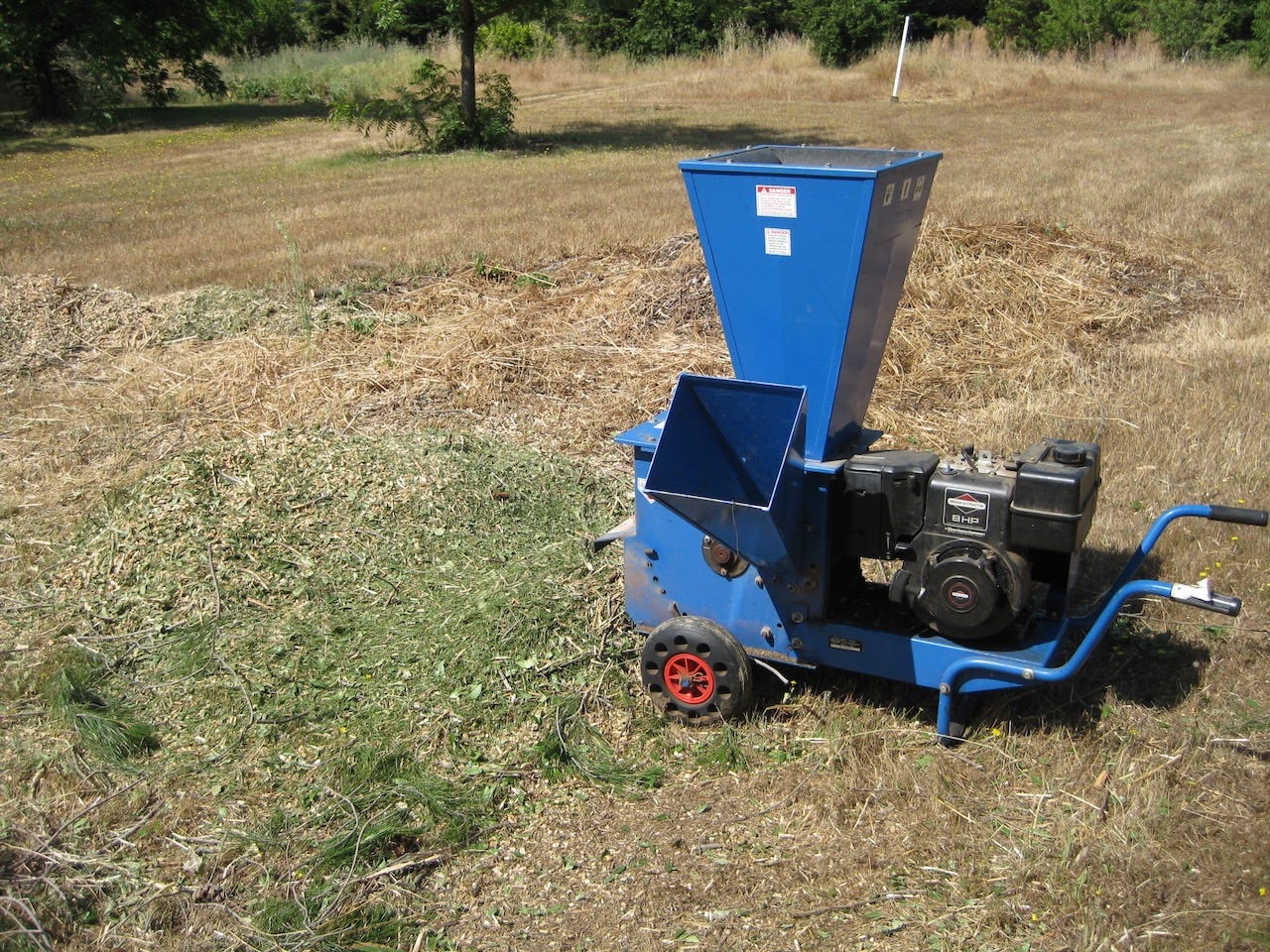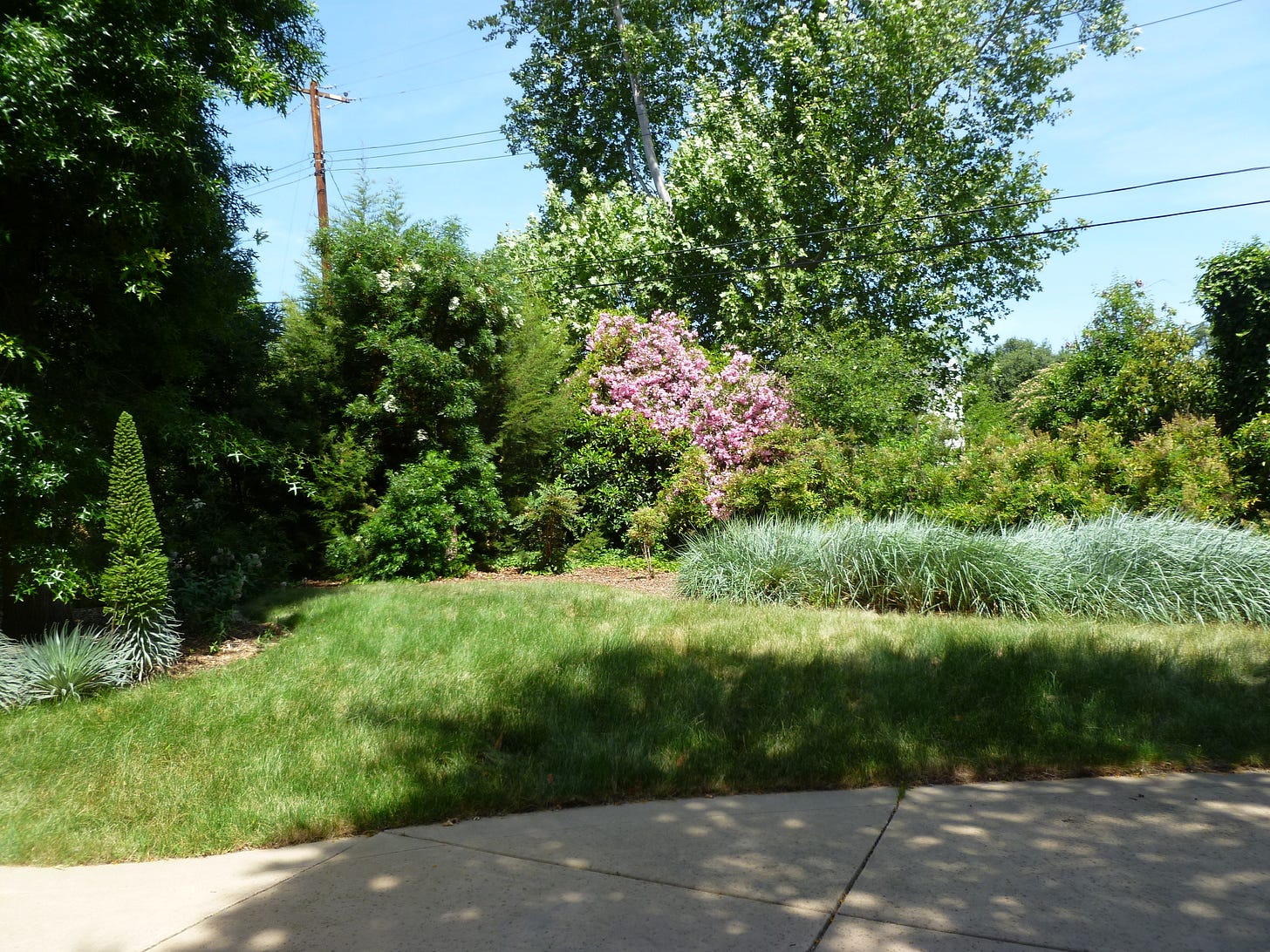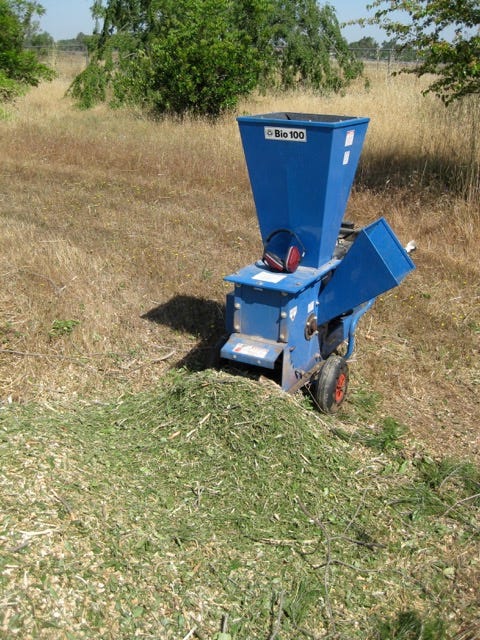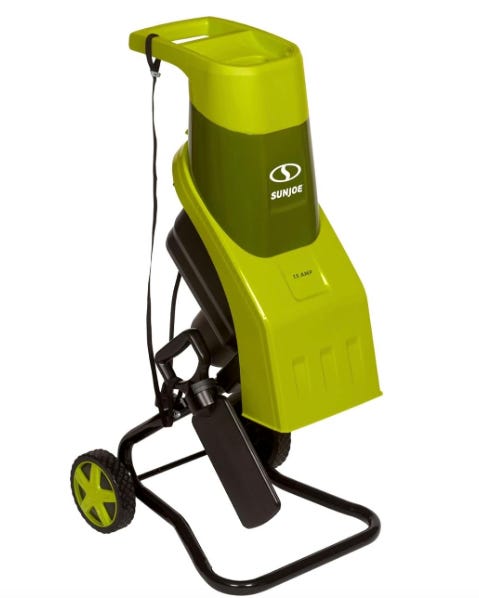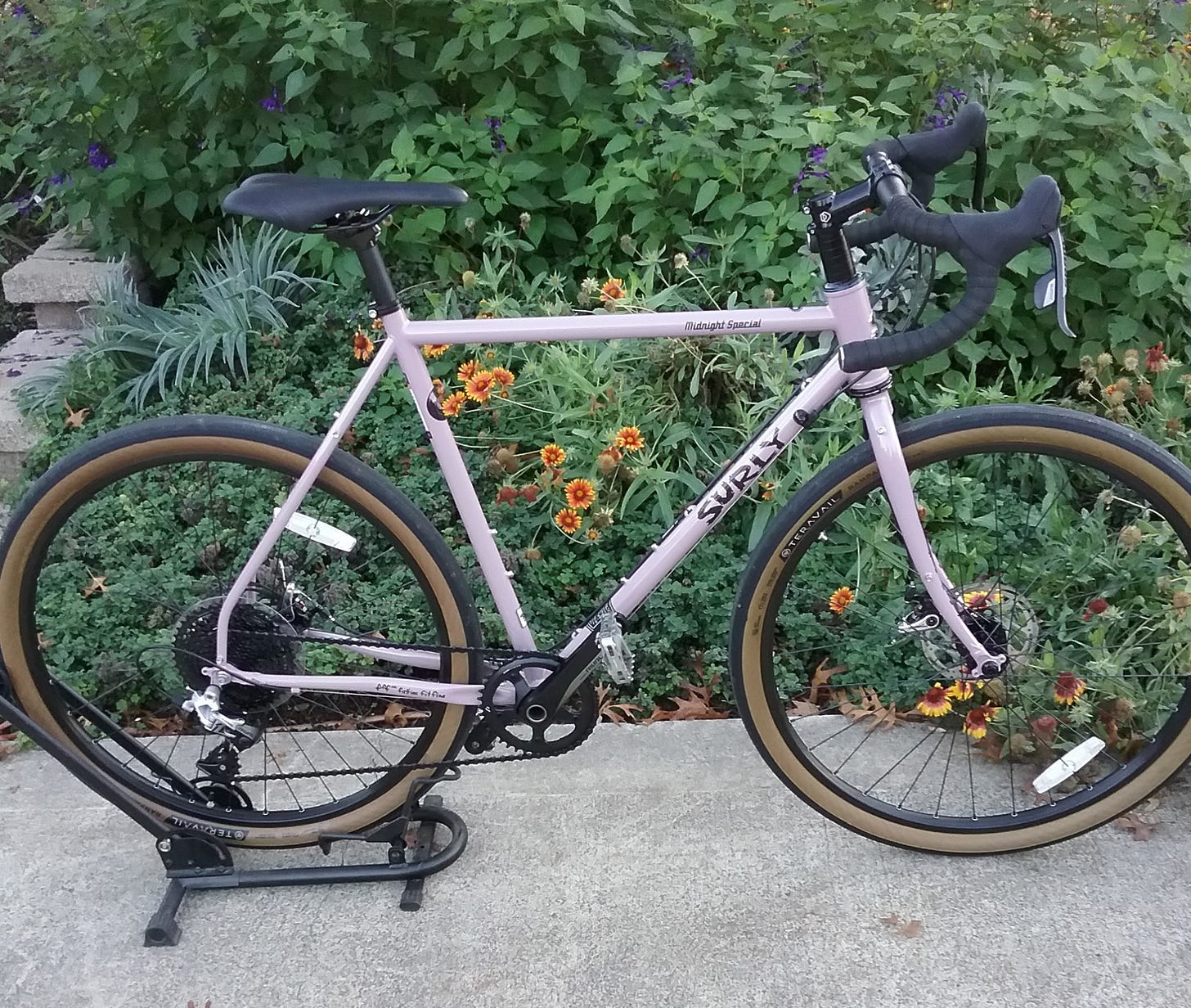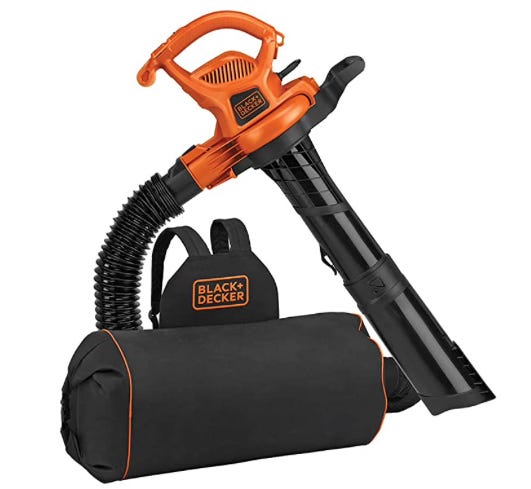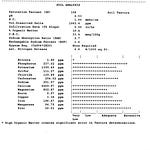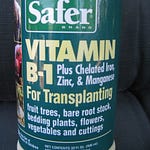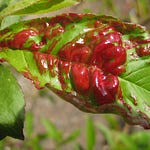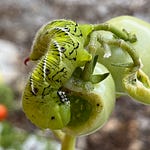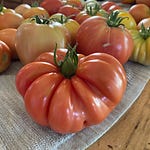With fall approaching, now might be a good time to invest in some equipment to ease autumn and winter chores as well as improve your soil: making mulch from tree branches with a chipper/shredder, or easing raking chores by gathering the fallen leaves with a device that blows them into a pile, sucks them into a 30-gallon bag, and chops them up into little pieces as they head to the bag, where you can then spread those chopped-up leaves as mulch. In today’s podcast (above) we talk with Brad Gay of JB’s Power Equipment in Davis, California about what to look for when shopping for a chipper/shredder as well as the niftiness of owning a piece of equipment such as a Shred n Vac that can reduce those piles of leaves into gardener’s gold: mulch! These segments were recorded during the first wave of Covid, so there may be mask references. However, I bet we all still have a box of masks somewhere handy.
What You May Have Missed on This Week’s Garden Basics Podcast
But first, a not-so-subtle plug for the latest episode (#354) of the Garden Basics with Farmer Fred podcast, Lawn Substitutes.
Ripping out or reducing a lawn come fall? In this episode, Fred and America’s Favorite Retired College Horticulture Professor, Debbie Flower, discuss lawn elimination and alternative landscape options. They address the challenges of transitioning from lawns to alternative landscapes, including weed management and aesthetics. They explore lawn alternatives that require less maintenance and water, such as no-mow lawns, fescue varieties, and ground cover like dymondia and clover. They caution against over-reliance on artificial turf and emphasize the importance of localized advice and education about plants that thrive in unique ecosystems. They also discuss the need for proper maintenance in all types of landscapes.
Chipper-Shredder vs Rototiller
Are you thinking about buying a rototiller? How about instead purchasing a chipper/shredder? Now, that's a machine that's going to make easy work of chopping up your garden clippings including tree limbs. it's going to make it into the greatest mulch you could possibly own. The latest research shows that rototilling your soil actually damages soil structure and doesn't do anything good for the soil biology. On the other hand, the end result of using a chipper/shredder is going to provide you with a quality of mulch that we like to call, "gardeners' gold".
Northern California Organic Gardening Consultant Steve Zien has some rather strong thoughts on this subject. Go back and listen to his comments back in Episode 89 of the Garden Basics podcast, from 2021.
Thinking that perhaps his opinions may have mellowed on the chipper-shredder vs rototiller choice over the last three and a half years, I recently asked for his thoughts. Nope. No change. Here’s what he had to say (in bullets):
Chipper shredder
Pros:
• Eliminates or dramatically reduces green waste
• Helps eliminate the need for a rototiller
• Provides material for mulch or compost
• When shreddings are applied to soil surface:
• Feeds soil biology – resulting in improvements in:
• Soil structure (pore space diversity)
• Improve movement in soil by water, air, roots, soil biology
• Soil water holding capacity (drought resistance)
• Nutrient holding capacity
• Biological diversity of soil microbes
• Greater variety of nutrients, vitamins etc. available to plants
• Improves pest resistance
• Plant health improves (drought resistance, pest resistance)
• Nutrient availability to plants improve
• Availability of natural growth hormones, vitamins improves
• Nutrient content of vegetables improves
• Sequesters carbon – contributes to the reversal of climate change
• Weed management benefits
• Mulch created by chipper/shredder moderates soil temperatures
• Erosion protection (mulch slows the force of falling rain)
• Mulch created by chipper/shredder repels some pests
Cons:
• Expensive
• Hard work. And, when done, you then have to apply the mulch to soil surface
• Don’t chip diseased material
Rototiller:
Pros:
• Get to smell actinomycetes
• Mental connection to past horticultural practices (although no longer recommended)
• Creates fine seedbed – but soil quickly becomes compacted making it difficult for sprouts to develop
Cons:
• It’s hard work
• Expensive
• Destroys soil structure
• Compacts soil (reducing aeration, drainage, limit root development)
• Fine clays quickly fill in pore spaces
• Increases runoff – transporting soil, nutrients and pesticides into our waterways
• Kills beneficial soil biology
• Makes it harder for your plants to grow
• Harder to obtain water, nutrients, growth hormones, vitamins
• Increases pest susceptibility due in part to:
• Reduced crop health
• Pest management provided by soil biology
• Reduces nutrient content of food crops
• Results in the need for additional irrigation, fertilization, pesticides
• Mother Nature’s natural rototillers (earthworms) are killed by the blades.
• Creates biological imbalance - abundance of bacteria vs. fungi (raises pH)
• Loss in biological diversity in the soil
• Reduction of soil health (results in reduction of plant health)
• Reduces ability of soil to function
• Releases greenhouse gasses (CO2) to atmosphere – contributing to global climate change
• Reduces organic matter content
• Reduces soils water holding capacity – need to irrigate more/more runoff….
• Makes plants more susceptible to drought
• Reduces food for soil biology
• Reduces soil productivity
• Reduces soil cover
• People feel they need to till every spring because previous tillage created a compacted, dead soil below
• Brings up weed seeds so they can germinate
Obviously, Steve has a bleak future as a salesman at Troy-Bilt.
How to Choose a Chipper-Shredder
(Originally aired in Ep. 51 of the Garden Basics with Farmer Fred podcast, “Chipper-Shredder Basics”)
Farmer Fred
We're talking with Brad Gay, he owns JBS power equipment in Davis, California. What are the benefits of owning your own Chipper/Shredder?
Brad Gay
The big, big thing if you're into gardening or if you're just starting out in gardening or whatever level of gardening you're at, the chipper shredder is going to give you a means of changing the soil quality of your garden and you're going to be able to get rid of stuff that you would maybe put in a container that the city or county would pick up; or you would have to haul it off. With this, you can maintain your yard and get rid of your trimmings, your limbs that have fallen down, and will chip them up to a size that is used as a mulch or as a top dressing. You can make your own mulch. If you're just even using them for small pots, you can get mulch and create a good high quality mulch and I can't think of anything better to accomplish that then a chipper-shredder.
Farmer Fred
Chipper shredders are great especially if you have a lot of trees on your property and you're constantly pruning your trees. Instead of throwing those branches away, chop them, shred them. Just add them to the top of your soil as a four inch layer of mulch on your soil. It moderates soil temperature, it inhibits weed production. As it breaks down it feeds the soil, making it richer. It's amazing too if you put four inches of mulch or even four inches of shredded leaves on your garden surface over the winter, and you go back in the spring you move it aside, and you dig down a few inches you'll be amazed at the number of earthworms that are saying thank you for doing that. And earthworms improve the soil too.
Brad Gay
But that's the fun of it. I mean I've been doing my garden for 20-25 years and I can go out and see the change. I don't have weeds, that’s one big thing. But I can actually go into my soil even after it's been watered and planted in there, I can still take my hand and kind of move it into the soil because it's porous enough. That because of the mulch and all the good ingredients have been added to it. To be able to do that takes a while, so a good chipper shredder is like is a very good startup, getting good quality soil going for you.
Farmer Fred
So let's talk about chipper shredder basics, what people should look for when buying a chipper-shredder. I would of course recommend buying it from a known entity, some company that you've heard of before, that has produced lawn and garden equipment as opposed to going online and seeing a bunch of names you don't know. But when you're looking at the specs of a chipper shredder, what are the specs you should pay attention to?
Brad Gay
Well, the big one I look at is what's driving your chipper, what's driving the shredder apart. These are two different entities there that are combined and one is a wheel typically, that has a cutter blade. Probably about four inches long but it's very hard steel. Probably two of them on what I call a wheel. And then the other part is on the other side. It has a bunch of little edger blades that are on small half inch shaft that spin around, and they will shred leaves. But the chipper part is very important because that reel that you have on there that's holding those blades, you want that to have some weight, because when they have that weight on there, that's what's going to pull the limb in and chop chop, chop it up. If you notice if you have somebody in your neighborhood who has been around and you'll hear that whirring sound that's going on, they have this huge flywheel turning. That's probably a commercial chipper, and it has some pretty good sized blades in there that can eat up like a nine inch limb or something like that. But you can get that same technology as a gardener for your smaller chipper Shredder. And I usually recommend about a 40 pound flywheel will be just about a good place to start. You have to look in to see if that entity exists on what you're going to buy. And you're not going to get it in your cheaper versions, like you say, you'll get something that's labeled a chipper shredder, but you're talking about things...well, I've been there. And believe me I've had things that have turned my fingernails black and blue because I'm trying to force a limb through there like I got a baseball bat hitting a steel post, it just rattles around. So you want to get something that's got a big flywheel, 40 pounds plus, and it'll help suck those limbs in through with very little effort and grind up a hardwood versus the softer wood. It does a great job.
Farmer Fred
What size branch diameter branch can a 40 pound flywheel handle?
Brad Gay
Well, depending on what you've got, usually I'm gonna say three inches, in some cases it's four inches, I think on a BCS model, it can take a four inch limb on there. But what's nice is you can take a good three, four inch limb, shove it down into the chipper shredder and I usually get it from where it is to the point where that now you're having the branches which with which would have leaves or smaller limbs and then when it gets to that point, you can take it out and then pick it up and put it over into your Shredder. And then that shredder will go in take care of the rest of the stuff the smaller limbs that if there's leaves on there, it'll take care of that as well and it just turns it into a fine, finer mulch. And a good chipper shredder, it will actually have plates where that mulch exits through, after it's been chipped, through a grid. And you can put in whatever size you want in there to make those pieces what size you want. Or if you're just doing corn stalks and you just want to reduce... like you grow popcorn, now you got to get rid of the stalks. Instead of throwing it into the greenwaste, you can instead shred that down. Well I take that grid out just to beat them up to go, so I can actually work it back in there. But they do have grids that you can install and it can make that mulch whatever size you want. It's actually a nice feature and that's what's pertinent in getting the good soil and mulch that you want for your gardens.
Farmer Fred
You know you brought up a very good point there, and the fact that we've been talking about chipping and shredding tree limbs, but for your vegetable waste in your garden, your corn stalks, or even your tomato branches, you could put those through a chipper shredder, probably the shredder portion.
Brad Gay
Oh I take all my grapes. I got these runners off of my grape plant that is trellised along a 300 foot fence that goes alongside of my yard and I put it all into grapes. And it's all table grapes. So you know grapes, and the grapes are one of those plants where you can literally watch it grow. So you've got these runners that are you know 10-15 feet long. And I'll just cut those off in the fall and I'll bring those over and get rid of all of that. And you have to make sure when you're using your chipper shredder, by the way, if you're doing this because if you get you put a bunch of these grape vines that you're sticking in your shredder, it is like sucking spaghetti into your mouth. This “Spaghetti” starts spinning around and flipping around, except this is a like a whip. So you have to wear eye protection, hearing protection, long sleeves, leather gloves so that you don't get smacked. And it gets rid of a lot of stuff you just never thought of before: all your fruit tree trimmings, when you prune trees in the winter to get things ready for your peach trees and apricot trees. All those trimmings you can put through a chipper shredder too. And what you have in pile there will reduce it to at least 12 to one or more. It's amazing what comes out after you do that.
Farmer Fred
I would like to reinforce your safety comments because anybody who's ever owned a chipper shredder and attempted to throw in some thinner, but longer branches. Like grape branches, for example, yes, they will whip at you because of the friction, the sucking action of the shredder that just basically tries to suck it all in. And in the meantime, you've lost hold of those branches and they start whipping around.
Brad Gay
Oh, yeah, you just let it go. It's like I got a bunch of whips. So yeah, you just want to protect yourself. I would say protect yourself. Like you're gonna go into a beehive. You know, you don't have to have that big big helmet on but you know, have eyeglasses on the helmet or a hat or something? I wear headphones for my ears just for the noise and all that that it deals with. So I protect myself quite well when I go out there.
Farmer Fred
And please do wear gloves and take off any jewelry or wristwatches you might have as well.
Brad Gay
Oh yeah, and keep track of your pruning shears.
Farmer Fred
Yes, yes. Yeah, don't keep your eyeglasses in your top breast pocket. Yeah, it's, it's follow all safety instructions when you get a chipper Shredder.
The cost of a chipper shredder is not cheap, but I'd rather see people invest in a chipper shredder than a rototiller. More and more research coming out about roto-tilling soil is that it does the soil no good at all, you're better off doing no tilling whatsoever, and more and more farmers are going that route as well. So take that money that you might want to spend on a rototiller and put it into a chipper shredder. what is the price range for a decent chipper shredder?
Brad Gay
Well, it starts at about I would say about 800 bucks with entry level if you get a Bearcat. And that’s in the near and dear two inch to three inch chipper shredder range. That's light use. And that's a good starter. And it certainly will do the job and it doesn't take care of what the next level is, which is about 1200 a little over 1200 dollars. And it will take on a three inch limb and everything I've been talking about. I've had my chipper shredder for years, it's got to be 25 years plus. And you just have to maintain it. But it's one of the most useful things when you need it. And then you don't have to deal with a pile of trimmings and try to get it to the garbage can or get it out of the yard on the curb, if they still do that where you live; or have to haul it off somewhere. Now you can take that and make it into a very useful product that will benefit your own garden. It starts about 800 bucks. And you can go up to in the two to three inch range. For $2000-$3000 you go into four inch range.
Farmer Fred
Talk a little about the different brands that are available. You mentioned Bear Cat, I own a BCS and they are both high quality chipper shredders.
Brad Gay
Oh, BCS is an excellent chipper Shredder. that's what I have. Go to BCS America website if anybody wants to go into it. That is a great site just to visually see what a chipper shredder can do for you and your garden. I mean it's amazing, the gentleman who did the video. He incorporates a lot of stuff in his in the mulch and cardboard for instance, he's taken cardboard, newspaper and those leaves of limbs and everything else has been debris that normally you would throw in a trash can or try to get, you have to get rid of it somehow. Or leave it in a big pile and let the rodents get in there and live healthy. But the best way is running all of it through a chipper Shredder. But that's a very good video, just go to that site, BCS America, a very good quality chipper shredder. Bearcat is very good. We also sell DR, which is Country Homes Products, they offer very good chipper shredders, we have accessibility for Bear Cat locally. So that’s for people who want something that they can actually come in and buy it locally. I can get it rapidly. If I have to get DR that takes usually seven to 10 days. And BCS takes me about five days to get their stuff. So those are three of the top names that are out there that I would recommend.
Farmer Fred
When one goes online and sees the array of chipper shredders. They're going to, I think, see the majority of them, unfortunately, are electric powered. I don't know if, "unfortunately" is the right word or not. But it just seems to me that a gas powered chipper shredder has more power than something that's powered by 110 volt electric.
Brad Gay
We used to sell the electric, this was some years ago. And in Davis, there was a viable need because most of the gardens there, are relatively small, I would consider. And they were using for table scraps and clippings and leaves and stuff like that. And they work well. But the problem with it, it had to fit in a slot to get it to go down into this chipper shredder contraption. The opening is about the size of a medium size book, it was only like two inches, two and a half inches wide, and maybe 12 inches long. And it was like you're trying to squish things down into this slot to get it in there to work. They've improved it quite a bit better. But with gas powered units, a lot of my problems are, if you get something in there, you get too much in there and it starts to plug up. And then you need to stop it. With gas power, you can shut the engine off. But if electric, if you do cause that thing to run and not be, actually turning over, you can cook those motors pretty easily. And we found that there was not a substantial amount of electric failures. But it's like a an electric lawnmower, if you use electric lawnmower, and you're out there trying to cut grass that's 12 inches tall, you're slowing that motor down, a lot those motors overheat. And because you're plugged into the grid, it's just endless energy and those motors overheat. And so I don't give them a real thumbs up on quality. I know electric products have really kind of taken over the imagination for most people out there as far as tools and that, but I don't think this is money well spent, at least at this point.
Farmer Fred
And whichever unit you get, you want to follow all the instructions in the booklet that it comes with. And you mentioned a problem that all chipper shredders have be they electric or gas: they can sometimes jam up. And yes, very important to turn that motor off as soon as you sense that it is not chipping or shredding.
Brad Gay
Yeah, you'll lose a belt or you'll cook a motor is what will happen if it's electric. But the belt, if you lose the belt, now you're done. And you got to go get a belt. We do restock belts for what we sell and we have access to them fairly rapidly. But you're done for the day, you just don't go down to a hardware store or auto parts store and buy another belt. That's just a mess. It's not gonna happen. So you got to stop those things relatively quickly.
Farmer Fred
All right, chipper shredder, great investment for making your own mulch from not only tree branches, but your garden, your grape vines, your corn stalks, any sort of woody material can become your mulch in your garden.
Brad Gay
Oh yeah, it's tremendous. Yeah, what it is I would recommend that I agree with you about the roto tiller and the chipper Shredder. I would spend the money on the chipper shredder first and then if you need a roto tiller I use a roto tiller but I've got a pretty good sized piece of ground but it's not used as much as I did before. I don't need to do that.
Farmer Fred
We've been talking with Brad Gay from JB's power equipment in Davis, California. Chipper shredders: every gardener should own one. Thanks, Brad.
Brad Gay
Thanks, Fred. Good talking to you.
What About Electric Chipper/Shredders?
For that, we turn to Debbie Flower, who owns an electric chipper-shredder, the 15 amp Sun Joe. Her review:
My chipper is a Sun Joe 15 amp Electric Wood Chipper/Shredder plug-in, model #CJ602E. I have had the pleasure of using it only a few times. It is a compact, easy to store machine. The 6” wheels and light weight make it easy to move around the yard.
The hopper at the top accepts material to be chipped, and a plastic device that fits in the hopper is attached making it safe to push wood into the chopper. Chips come out the bottom. To collect the chips I put a larger grow pot, about 12” tall, under the output hole. Chips are smaller than those of arborist chippings and great to add mulch to the garden.
The Sun Joe makes quick work of wood that is stiff and up to 1.5” diameter, the maximum suggested to put in it. Letting fresh prunings from live plants dry a day or two makes it easier to chip them. Fresh prunings do get chipped but the thinnest of these and any leaves attached are more likely to clog the machine then they do if they are a bit drier.
I have tested the machine by pushing branches larger than the suggested limit through the hopper. They did go through and get chipped, but the strain on the machine was evident by the noises it made and, eventually, how hot it got.
I am somewhat disappointed in how poorly it handles the thinnest branches. They go in the hopper and either come out the bottom in long, maybe a foot long, pieces, or they clog the machine. The machine does not successfully chip soft plant material like dead stems of herbaceous perennials. Because of this I have not tried to shred leaves using the Sun Joe.
I am not one to purchase every new-fangled garden tool but am happy to have this one in my garage. It was not expensive, is very easy to use, requires little maintenance, and the chips I get from the it add to the mulch in my garden.
My thoughts about electric-chipper shredders are closely aligned with Brad Gay’s opinion (above). Reviewers of this electric chipper shredder say they have issues including the shredding problems mentioned by Debbie, and the overheating problem she mentioned. As Brad said, it’s cheaper to replace a belt on a gas chipper/shredder when the machine gets overwhelmed to the point of freezing up with material jammed in the hopper, than it is to replace a burned out electric motor. And make sure you plug the unit into a 20 amp outlet, not 15, to avoid tripping either the house circuit or the overload circuit on the machine. And as with any outdoor electric-powered garden implement, make sure you have the right gauge extension cord which is determined by the power pull of the unit as well as the length of the extension cord.
Reviews of Sun Joe chipper shredders by owners on Amazon also complained about the unit’s inability to chop thin branches, as well as the difficulty to replace the blades, which need to be sharp to do an effective job. Still, most reviewers were very satisfied with this particular Sun Joe 15 amp chipper-shredder. One reviewer did offer a helpful suggestion to avoid clogging situations: “If you feed large branches up to 1" (or more) you really have to hold on to them and only let it take a little at a time, pull it up off the cutter (still inside the safe area) then feed more. One reason it jammed is that when it passes the safety cover it's still several inches long, which is good safety wise, but it will fall over onto the cutters when you're no longer holding on to it. That ends up turning that 1" diameter stick into a 1 1/2" + oval. (turn a cylinder on an angle and it's a long oval) Feed something small along side it and it will keep it vertical. That can help. I learned to just chip smaller stuff.”
Farmer Fred’s Ride for the Kids!
I'm fundraising on behalf of the Sacramento Rotary Club’s 2024 Sacraamento Century Challenge bike ride on September 28th to raise money for the Sacramento Children's Home Crisis Nursery and I could use your support. Here’s the link.
On that date, I’ll be riding my bike, a Surly Midnight Special (NOT an e-bike) 100 miles along the Sacramento River to help out the Sacramento Children’s Home Crisis Nursery. I’ve ridden 100 miles in one day plenty of times…when I was younger.
But at 73, I could use some moral support, and the Sacramento Children’s Home Crisis Nursery can use your pledge money. So, how about it? Maybe pledge 10 cents a mile (that’s $10) along with a hearty, “You go, Fred!” Or a more generous one dollar a mile ($100), to give me the mental endurance for the entire ride, to dodge the pothole-filled levee roads and pedal harder in the ferocious headwinds that makes this ride a real challenge!
The Sacramento Children's Home Crisis Nursery is the only program of its kind in Sacramento County and directly prevents child abuse and neglect by supporting families with small children at times of crisis. The nursery allows parents to bring their children ages newborn to five for emergency hourly or overnight care during difficult times, with the goal of keeping families together and reducing the number of children entering foster care. To care for our community's most vulnerable children, we rely on support from community members like you. By donating, you empower us to provide a safe haven for children throughout the Sacramento area, offering respite to parents during times of crisis, and building a strong support system for the future. Your support helps provide a safe place to stay local kids in need. Again, here’s the link to make a donation to the Sacramento Children’s Home Crisis Nursery. Or do it because this newsletter is still free (for now).
Thank you for your support, and say "Hi!" if you see me pedaling like crazy out there along the Sacramento River on Saturday, September 28th! Here’s the link to help support the Sacramento Children’s Home Crisis Nursery.
All About Leaf Mulchers
(Originally aired in Episode 54 of the Garden Basics podcast, “Easy Leaf Mulch”)
EASY LEAF MULCHING
Farmer Fred:
We're talking with Brad Gay from JB's Power Equipment in Davis. And if you're a gardener, every fall, if you have leaves or if your neighbors have trees with leaves, those leaves make an excellent mulch, they can improve your garden soil, and it's pretty easy to improve your soil. If you don't have a winter garden. When those leaves fall in October, November, December. you grind them up, you put them on your garden bed, stack it up as tall as you want, four inches, eight inches, 12 inches. and then the following spring, you've got improved soil, no question about it. The problem is, all right, how do you gather up those leaves? How do you grind them up? In the past, what I've done is use the leaves from my neighbor’s 60 foot Pin Oak tree. So I'll go over there, rake her leaves, put them in a metal 30 Gallon Trash Can, stick my string trimmer down into that metal trashcan and sort of whip it around and grind up those leaves. It does an okay job but not really a great job of making all those leaves smaller. There's something on the market that if you want to do that, too, it makes it a heck of a lot easier. We're talking with Brad Gay from JB's Power Equipment in Davis. And Brad, I like the idea of having a tool that sucks up the leaves and grinds them and then I can just dump it onto the garden bed. That sounds pretty darn easy. What are those instruments of destruction?
Brad Gay:
Well, it's a great tool, it's a conversion of your handheld blower, is what it amounts to. And they've gone in and adapted the front of the blower that brings in the air for the blower to blow out the pipe to blow your leaves. Well they put a tube on that so now it becomes a vacuum. And the blower exit you would be blowing has a curved tube to it. that attaches to a bag before you put that tool on, If you look on the inside of that blower, there are little metal shredders, something you wouldn't want to touch.
Farmer Fred:
Thank you.
Brad Gay:
That way you can't run it with that tube off.
Farmer Fred:
Yeah, that's great.
Brad Gay:
So that's a very strong safety feature. But it's metal, like a mower blade, but a real small version of it. That's a shredder. So now you can go in and suck up all the leaves in these areas. And it hits that shredder device and puts it in your bag and it's a 12 to one ratio reduction. So in areas like under shrubs that you've got that you can't get to as easily or let's say your around a pool and you're in corners where leaves are collected. In my case I have large Sycamore leaves. So now you got to reduce that to be able to use it. So by using this, by sucking that debris up and going through that shredder, it reduces that down. And most of the pieces are about less than the size of a dime, which is pretty good considering how big that leaf was originally.
Brad Gay:
I've been very satisfied with it, you save a few steps, you just take it out, dump it. You can use it right then as long as you don't have to go shred it up. I live in a house that has two huge sycamore trees. And before I had a chipper shredder, or had a vac and sack or a shredder vac, I had tarps that I would hold in my backyard and put them on my garden. And I'd have piles back there. Well, it reduced really well. But for corn leaves, which are a pretty good sized leaf. So in the spring, I'd go out there, and there at the bottom of the pile there's still some of those leaves in their original configuration. Wow, since I've started doing the chipping and the shredding and reducing that and then putting it on a yard, it's done. it's mulch. it's ready to use right then. There's no big piles anymore. So that vac and sack, That's a great tool to have.
Farmer Fred:
Yeah, I noticed on your website, JBSpower.com, that the Echo people have one called a shredding vac. And actually, it's three units in one because it's a blower, like a typical leaf blower, it's a vacuum. And it's a shredder mulcher.
Brad Gay:
Yeah, that's the whole thing. But it's got a nice bag on it so that when the bag has a strap that goes over your shoulder, it's like you're carrying it. it has a rear handle to it. So usually you have an upper handle on a blower or a handheld blower, well, this actually has a rear handle, so you can hold it and the upper handle, so you got two hands on there. And then you have a strap that's on the bag that you put over, like a backpack kind of sling that goes over your back. So then you power the leaves in that bag. Well, when that starts getting heavy, that's about time for you to go dump it. So I'm gonna say it’s about a 30 gallon, plastic bag container. Not quite that but it's a good amount that you can pick up and get rid of all that debris in a timely fashion. So you can go do other things in your garden.
Farmer Fred:
Now we're talking here about the Echo shredding vac. But I imagine there's other manufacturers with very similar items.
Brad Gay:
yeah, there is. Stihl has one, there's is the same idea. We also sell that , which is competitively priced. The same thing, there's no difference. everybody's producing stuff like that. But both of these companies are top of the line. And they're run by people that if you do have a problem with this piece of equipment, you've got someplace to go to which is a good thing to fall back on. That's what I meant. Buy the best and cry only once, a little bit. But you generally just don't have the problem.
Farmer Fred:
The Echo unit we're talking about and I imagine the Stihl unit as well. They're both two stroke gas engines, correct?
Brad Gay:
That's correct. Wear a dust mask when you're doing this.
Farmer Fred:
Yeah, we got plenty of masks these days.
Brad Gay:
Well, yeah, everybody has access to those for some reason. Yes.
Farmer Fred:
All right. garden mulch. I've preached it for years. It's the one of the best things to add to your garden and you don't have to till it in. you can just lay it on top. You can plant around it. garden mulch has numerous benefits. It blocks weed seeds from sunlight so they don't germinate. It promotes better water retention. It provides needed nutrients as it decomposes. It moderates soil temperatures as well. Mulch is wonderful. Why not make it yourself from the things that are around you, that are falling, tree branches or leaves. I think a shredding vac is the way to go for just about every gardener.
Brad Gay:
I've been using it for about three years now. But you know when I'm so glad that I got a number of friends that have similar landscapes and they have it and they use them quite a bit themselves too. It's really a nice handy tool. There you go. If you need a blower you've got a blower too. So if you want to just blow things around, get it into a pile and then put the bag on there and the other hose and now you can shred everything up out of your pile. So it's a two in one, three in one device.
Farmer Fred:
Well, I thank you and my next door neighbor with the 60 foot tall Pin Oak Tree thanks you as well, with this information about the shred and vacuum. If you're going to have one garden tool that might set you back a couple hundred bucks, this would be the one to have, to make your own mulch and improve your soil. We've been talking with Brad Gay from JBS Power Equipment in Davis, California. Brad, thanks so much.
Brad Gay:
Fred, it's always a pleasure talking to you.
Subscribed
Thanks for reading Beyond Basics: The Garden Basics with Farmer Fred Newsletter! Subscribe for free to receive new posts and support my work.
Thank you for also listening to the Garden Basics with Farmer Fred podcast! It’s available wherever you get your podcasts. Please share it with your garden friends.
Fred Hoffman is also a University of California Cooperative Extension Master Gardener in Sacramento County. And he likes to ride his bike(s).



